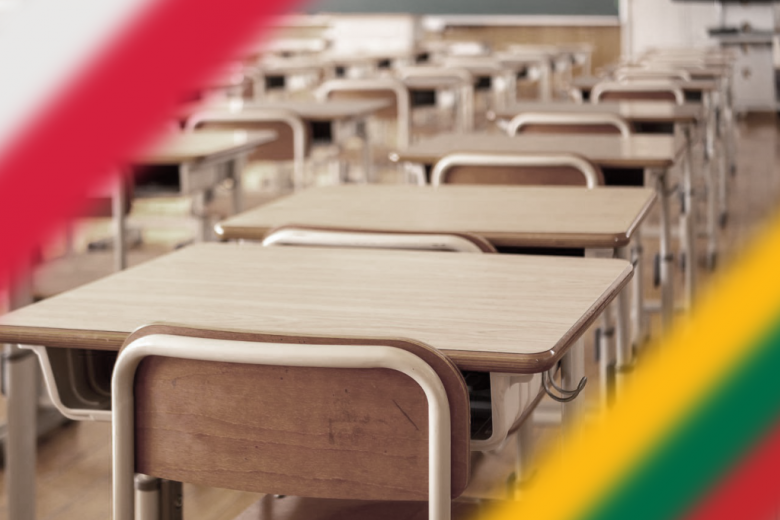Students from Lithuania’s large ethnic Polish minority have been able to take high-school graduation exams in the Polish language for the first time in a quarter of a century.
This week, 778 pupils at Polish schools in Lithuania took exams in Polish language and literature, reports Lithuanian state broadcaster LRT.
“This is a historic day for us,” Krystyna Dzierżyńska, president of the Association of Polish Schools in Lithuania, told the Polish Press Agency (PAP). “After a quarter of a century of patience and pushing, we have finally managed to restore the native language exam in our schools to the proper level.”
Po 25 latach na Litwie wróciła matura z języka polskiego w randze egzaminu państwowego. Duża rzecz! 🇱🇹🇵🇱 https://t.co/MY2dKufWx8
— Chmielewska-Szlajfer (@HChSz) June 23, 2024
With around 183,000 members according to the 2021 national census, the Polish community constitutes 6.5% of Lithuania’s total population and is the country’s largest ethnic minority.
However, in 1998, the education ministry decreed that exams taken in minority languages would no longer count as official school-leaving qualifications, reports PAP. Many pupils at Polish schools continued to take exams in Polish, but they had to also separately sit official Lithuanian exams.
In 2019, the Lithuanian and Polish education ministers signed a declaration on the education of their respective minorities in each country. According to Poland’s most recent census, also from 2021, just over 10,000 people identify as ethnic Lithuanians.
That agreement led to the restoration of high-school graduation exams in Polish in Lithuania. In 2022, a core curriculum for students taking Polish language and literature was introduced, notes LRT.
Język polski powróci na listę przedmiotów obowiązkowych na maturze na Litwie. Dziękuję @SzSz_velSek 🇵🇱 pic.twitter.com/svhHHTGdLL
— Tomasz Rzymkowski (@TRzymkowski) November 26, 2021
On Tuesday this week, the first set of pupils took final exams based on that curriculum. Among the essays they could choose from was writing an interpretation of the poem “The Envoy of Mr. Cogito” by renowned Polish writer Zbigniew Herbert. The results will be published on 12 July.
Dzierżyńska told PAP that she hopes the restoration of official exams in Polish will help improve the quality of Polish teaching in Lithuania, which “has been pushed to the margins in recent years”.
She noted that the 2019 intergovernmental agreement has also facilitated the import of new textbooks to Lithuania from Poland, replacing previous decades-old ones that were “outdated and physically worn out”.
Lithuania’s prime minister @IngridaSimonyte has called for Polish to become the most commonly taught second language in her country’s schools rather than Russian https://t.co/eU4Sl0gId8
— Notes from Poland 🇵🇱 (@notesfrompoland) February 2, 2023
Danuta Szejnicka, a Polish teacher working at Lithuania’s National Education Agency, told LRT that Polish and Lithuanian teachers have been cooperating closely to “balance sometimes-different teaching approaches” and ensure that, “regardless of the language of instruction, [pupils] develop the same skills”.
Last year, Lithuania’s prime minister, Ingrida Šimonytė, called for Polish to become the most commonly taught second language in her country’s schools rather than Russian.
In 2022, Lithuania introduced new rules allowing Polish letters that do not exist in the Lithuanian alphabet to be used in official documents. That resolved an issue that had long been a cause of complaint from the Polish community.
Lithuania’s justice minister has celebrated that she and the country's other 183,000 ethnic Poles can now officially use the Polish spellings of their names after a change to the law.
Previously known as Evelina Dobrovolska, she is now Ewelina Dobrowolska https://t.co/y6A55vea4A
— Notes from Poland 🇵🇱 (@notesfrompoland) May 25, 2022

Notes from Poland is run by a small editorial team and published by an independent, non-profit foundation that is funded through donations from our readers. We cannot do what we do without your support.
Main image credit: RPO (under CC BY-NC-ND 3.0 PL)

Daniel Tilles is editor-in-chief of Notes from Poland. He has written on Polish affairs for a wide range of publications, including Foreign Policy, POLITICO Europe, EUobserver and Dziennik Gazeta Prawna.



















